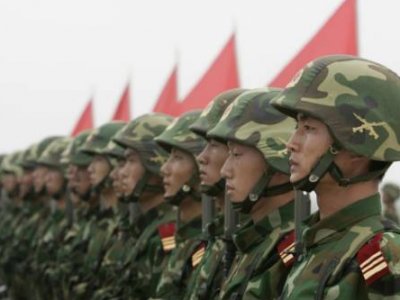Department of Defense recycles Chinese intelligence
posted by Free Press Houston @ 4:10 PM

By Alex Wukman
The Department of Defense released the new Military Power of the People’s Republic of China Monday that stated China will have a 17.6% increase in military spending. A figure the Washington Post reported as being “roughly equal to last year’s increase.”
Unfortunately the Washington Post was only half right with their statement. China’s spending increase isn’t about the same as last year’s it is last year’s. In fact much of the 2008 report is the same as the 2007 report with minor changes in wording.
The beginning of the executive summary to the 2007 report states “China's rapid rise as a regional political and economic power with global aspirations is an important element of today's strategic environment -- one that has significant implications for the region and the world. The United States welcomes the rise of a peaceful and prosperous China, and it encourages China to participate as a responsible international stakeholder by taking on a greater share of responsibility for the health and success of the global system.”
The 2008 report begins with the lines “China’s rapid rise over recent years as a regional political and economic power with growing global influence is an important element in today’s strategic landscape, one that has significant implications for the region and the world. The United States welcomes the rise of a stable, peaceful and prosperous China.” The report then goes on to reuse the “responsible stakeholder” line.
The 2008 report also states in the Executive Summary that “China’s near-term focus on preparing for contingencies in the Taiwan Strait, including the possibility of U.S. intervention, is an important driver of its modernization. The 2007 report found that “China's near-term focus on preparing for military contingencies in the Taiwan Strait, including the possibility of U.S. intervention, appears to be an important driver of its modernization plans.”
Further on in the section labeled “Developments in China’s Military Forces” The 2007 report irrevocably states that “China is pursuing long-term, comprehensive transformation of its military forces to improve its capabilities for power projection, anti-access, and area denial. Consistent with a near-term focus on preparing for offensive Taiwan Strait contingencies, China deploys its most advanced systems to the military regions directly opposite Taiwan.”
Inexplicably the 2008 report finds the same conclusion in a little different wording “China’s long-term comprehensive transformation of its military forces is improving its capacity for force projection and anti-access/area denial. Consistent with a near-term focus on preparing for Taiwan Strait contingencies, China deploys many of its most advanced systems to the military regions opposite Taiwan.”
In what many would argue is the single most important part of this assessment, the section on Ballistic and Cruise Missiles, the 2007 report states that “China is modernizing its longer-range ballistic missile force by adding more survivable systems. The road-mobile, solid-propellant DF-31 intercontinental-range ballistic missile (ICBM) achieved initial threat availability in 2006 and will likely achieve operational status in the near future, if it has not already done so.”
A year later and the information has become a little sparser, but it’s still there. “China is modernizing its longer range ballistic missile force by adding more survivable systems. Most notably the DF-31 and longer range DF-31A are now being deployed to units within the Second Artillery Corps.”
Another point of extreme similarity involves China’s deployment of missiles opposite Taiwan. In 2007 the Department of Defense stated that “By October 2006, China had deployed roughly 900 mobile CSS-6 and CSS-7 short-range ballistic missiles to garrisons opposite Taiwan, expanding at a rate of more than 100 missiles per year. Newer versions of these missiles have improved range and accuracy.
In 2008 they stated that “by November 2007 the PLA had deployed between 990 and 1,070CSS-6 and CSS-7 short-range ballistic missiles (SRBM) to garrisons opposite Taiwan. It is increasing this force at a rate of more than 100 missiles per year including variants of these missiles with improved ranges, accuracies and payloads.”
When it comes to submarine warfare the 2007 report states that: “China is also working on a new submarine-launched ballistic missile, the JL-2 (IOC 2007-2010), for deployment on a new JIN-class (Type 094) nuclear-powered ballistic missile submarine, also in development.”
And the 2008 report: “China is also working on a new submarine-launched ballistic missile, the JL-2 for deployment aboard new JIN-class (Type 094) nuclear-powered ballistic missile submarines (SSBN). The JL-2 is expected to reach initial operational capacity (IOC) between 2009-2010.”
Sadly seeing that both of these reports state the same information begs the question how much does the intelligence community really know about China?












1 Comments:
The whole 'fear China' ploy is getting old. Their military spending is still a fraction of ours. They should fear us.
Post a Comment
Subscribe to Post Comments [Atom]
<< Home